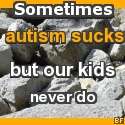
Not a lot is written about girls and autism, because it is just beginning to be understood. When Hans Asperger first classified it, he thought he had found a boys-only disease. It wasn't until years later that we are finding that more girls are affected than originally thought. The rate for those referred to for diagnostic tests is about ten boys to every one girl. But of those, the rate of diagnosis is one in four. That's one girl for every four boys diagnosed. This rate holds true for both classic and high-functioning autism/Asperger's Syndrome.
In the book edited by Tony Attwood, Asperger's and Girls mentions that one of the reasons that girls are less often referred for diagnosis could be that because girls are naturally more nurturing than boys, they take the "shy and awkward" girls under their wing. In this way, they teach them the social rules.
As a mother of both a boy and a girl with autism, I would agree that girls give more benefit of the doubt than boys do. Girls in elementary school can be kind and helpful to a girl who just doesn't get it. JBug, my oldest daughter had this experience with a friend. She is naturally slow to warm, reticent around new people or experiences. Her friend took her aside and taught her "Embarrassing Lessons," which was really just a way to teach her to laugh at herself and not be so self-concious. JBean has first grade friends that are very kind to her and accept her for who she is, at least at this age. In contrast, JBear has struggled with his peers, who find him "weird" and "obsessed." He often feels ostracized when it really was a matter of just being able to read cues in order to join a game.
JBug's friend also came alongside her and taught her some of what Brenda Smith Myles calls "the hidden curriculum," that is, all of the things that no one ever tells a child, that are considered polite, or kind. For instance, if JBear were to talk about Indiana Jones and as he was doing so, the person he was speaking with kept glancing at his watch and looking over my son's head , think that has happened before? that would be pretty clear to me that the person had somewhere to go and the conversation needed to come to a close. Someone with HFA/Asperger's would not get this reference. He would have missed the entire "non-verbal" conversation. According to a UCLA study, 93% of conversation is non-verbal. So you can see how difficult it can be to interact if you are effectively blind to the social cues!

In my experience, girls in elementary school are much more forgiving of social gaffes. By the time a girl reaches jr. high, it is expected that she will "know" the right things to do and say. If she does not, most girls will distance themselves from the girl who is less socially-savvy. Since girls bond with their "drama," any girl who doesn't play the game will almost certainly be, if not ostracized, just not befriended. I work as a church youth worker with jr high girls (now going into high school). For two years I have watched this happen. The interesting thing to me is that if a girl is more severely affected by Asperger's, they do give a little more leeway, but they still do not count that person as a friend. If a church group operates this way, I can only imagine that school must be even more difficult for a girl with Asperger's Syndrome.
I ran across this article today, about the perils of Asperger's as a female.
Dr Lorna Wing is a veteran psychiatrist who devoted her career to studying autism after her only child, Susie, was diagnosed with a severe form of the condition. She says girls on the autistic spectrum often appear "normal" at first meeting. "They appear to be more social than boys with autism, but then you notice that their sociability tends to be inappropriate," she says. "They might go on and on talking about the things they are interested in, and they fail to notice that you're not remotely interested. They have a poor ability to 'read' people, and that's something that's often very highly developed in females."from the Guardian
The article goes on to state that it can be difficult in the workplace for a woman with autism, because she doesn't pick up the social cues or display the empathy and understanding that many associate with females. She may face problems because of judgment.
This means that women with autism often struggle at work because they lack what is often taken for granted in women - the intuitive ability to understand where people are coming from and how to manage situations. Because of subtle sex differences, we tend to "expect" more of women in the workplace in terms of smoothing things over, of saying the right thing; and whereas we would excuse a man who lacked these abilities, we are subliminally a lot less forgiving of a woman who has similar shortcomings. from the Guardian
With all of this gloom and doom, sure I am concerned for my girls' futures. JBug has never been diagnosed with Asperger's, but has many traits that come with it, including brilliance, which will serve her well. She is already smarter than I am...shhh! Don't tell her! I believe JBug will be fine, eventually. She will find her niche and her "people"...once the drama from high school stage is finished. She doesn't have time for the gossip or the "immaturity" of her peers. Sometimes she is too serious for her own good. She will land in a scientific community, where Logic is king and Rationality rules all.
My youngest daughter is an enigma to me. JBean has been diagnosed with Autistic 
She cuddles a little too much, too hard, and doesn't stop when first asked. Her voice is just a bit *too high-pitched, almost baby talk. When she wants your attention she goes from 0 decibels to 999,999 in a split second. We say she has two settings: normal, and car alarm. She is very private about her thoughts, and I don't know if that is because she isn't keyed into them, or she just keeps them to herself. She is very difficult to read, and I am good at reading people.
She is still so young. Who knows what time and training have in store for her? And maybe as we go, more research will be completed that explains more of the mystery behind autism and what exactly we can do about it. I am thankful for articles in mainstream publications that shed light on the issue of girls and autism, but they are few and far between. For now, I continue to work with her, read a lot and pray. I definitely pray.
T, who wonders what the future will hold, but is optimistic

































1 sent chocolate:
Great post...as a parent of two sons, one with Asperger's Syndrome...I am most touched by your post. Oddly, I see a bit of my own past in what you have shared.
Thanks for being so open and never stop sharing. All of this will make a difference.
Post a Comment